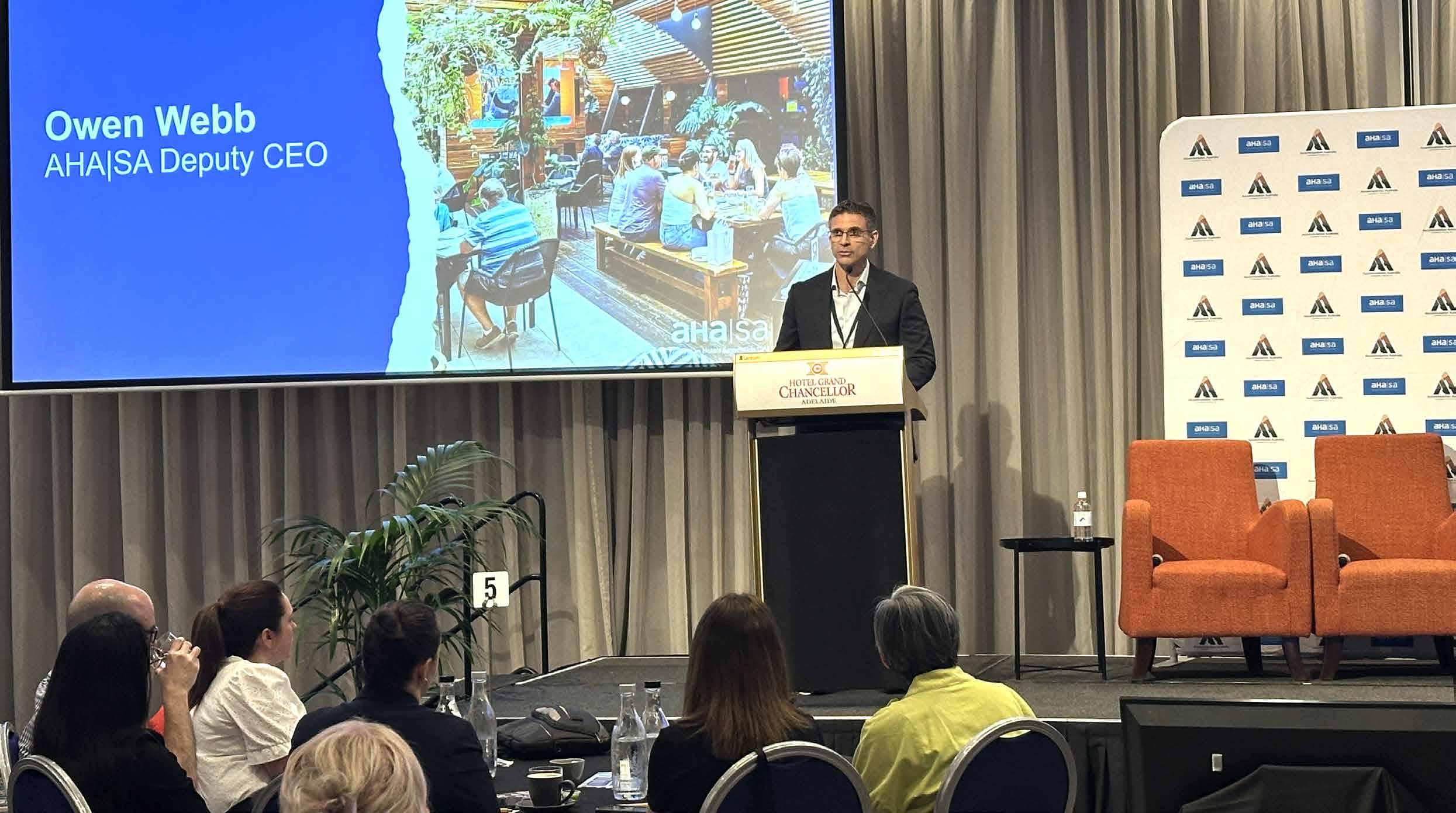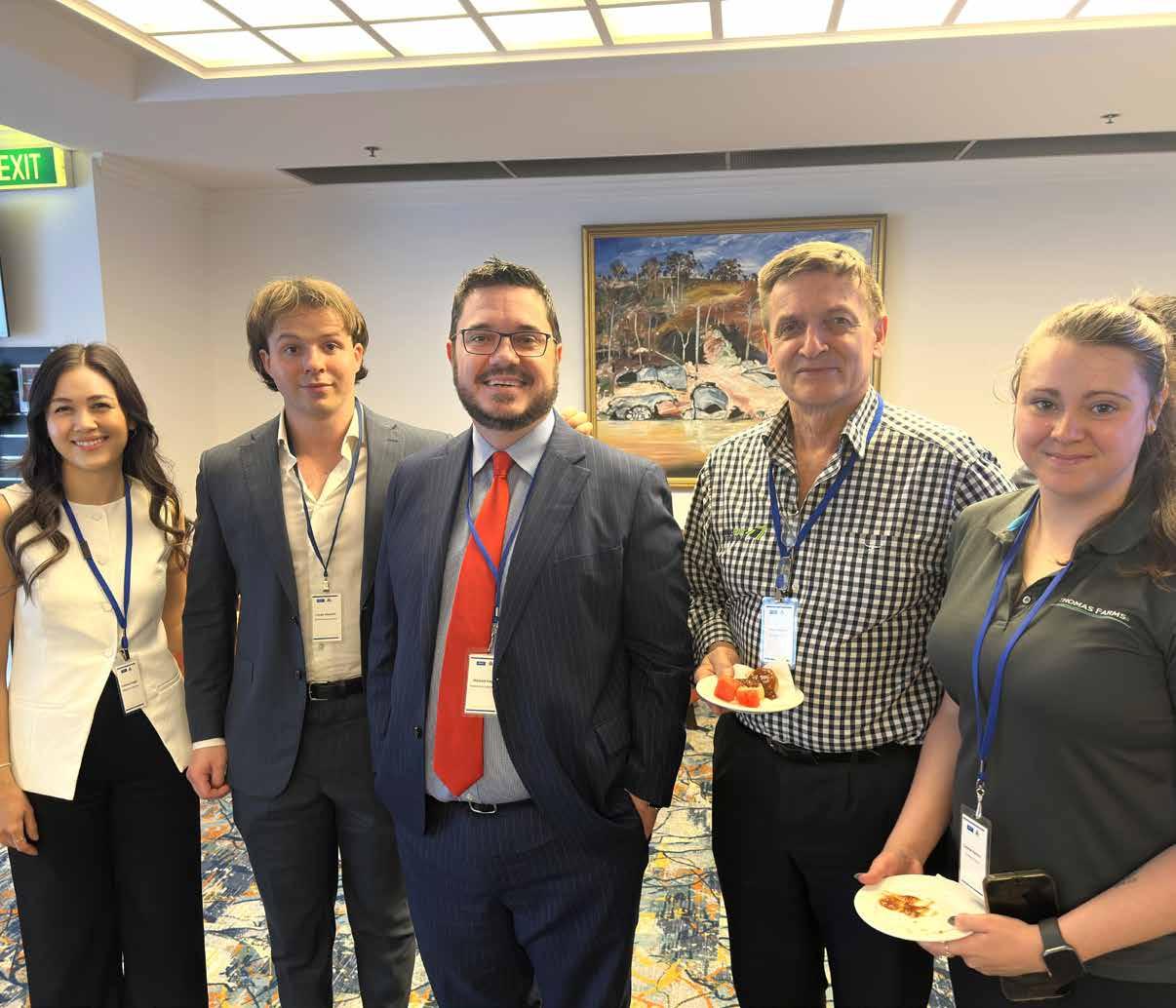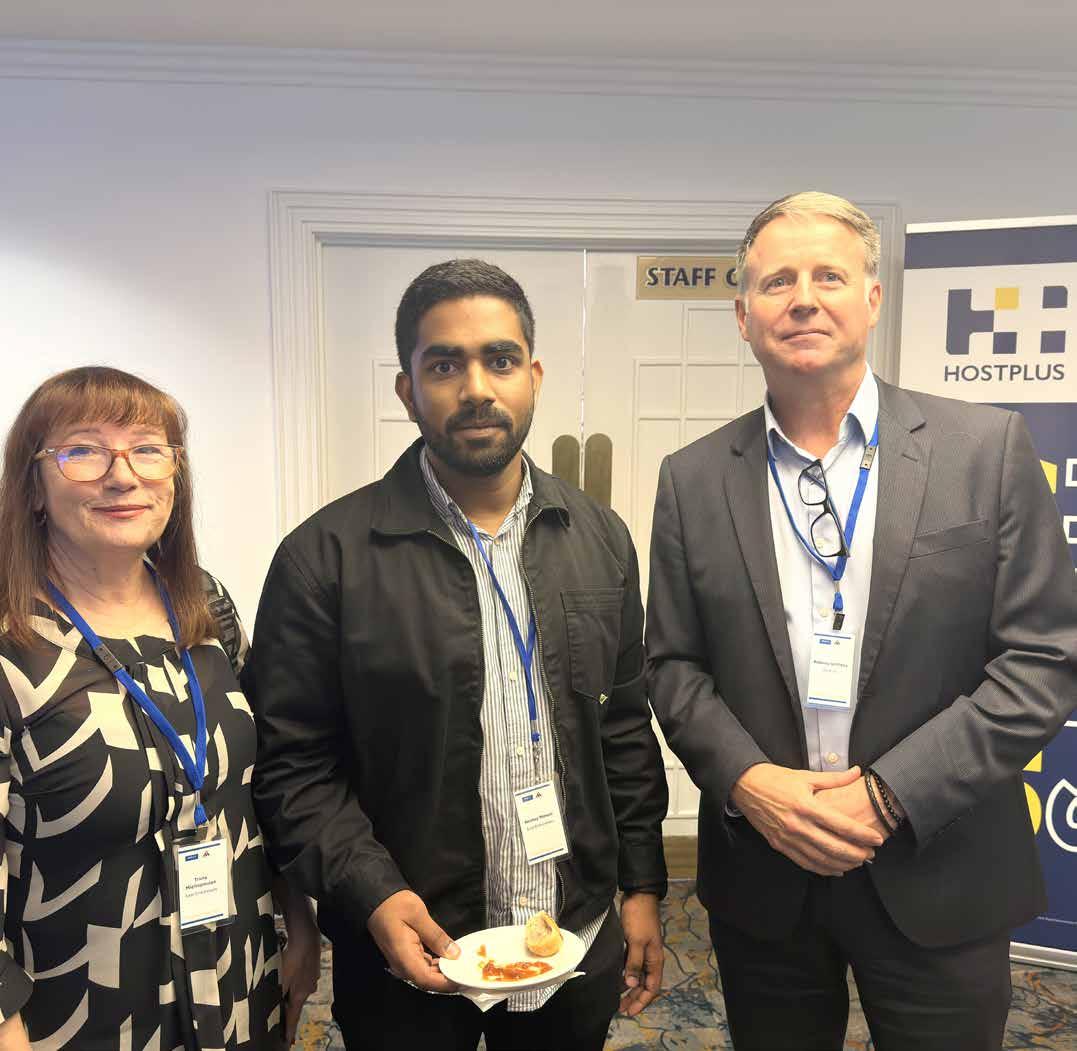
9 minute read
Blue chip advice at AHA|SA's first Human Resources and Employment Conference –Navigate and Engage
from Hotel November 2024
by Boylen
The inaugural HR and Employment Conference – Navigate & Engage – was an overwhelming success.
Approximately 100 people attended attended the fullday conference, which was held at the Hotel Grand Chancellor in Adelaide.
Participants left with considerable insight into how to attract, engage and motivate staff, ways to develop their skills as future leaders, and how common workforce problems can be solved.
The day was introduced by AHA|SA Deputy CEO, Owen Webb who explained why the conference was named “navigate and engage”.
“In recent years there have been a significant number of legislative reforms from an employment perspective which have posed challenges for businesses in our sector to navigate their way through,” he said.
“It’s never been more difficult to source and retain staff. Many of our members have found themselves having to train staff that don’t have the level of experience they were accuomed to in years gone by.
“So today is also about coming together as industry peers to share ideas in areas such as recruitment and migration, retention of our staff, creating healthy workplaces, understanding the current and future HR trends and looking at how we develop and motivate our future leaders.”
The following is an overview of some of the points raised by speakers.
Connie Letizia, Account Manager at Hostplus (major sponsor of the conference):
Flagged upcoming legislation including accumulating the Superannuation Guarantee on paid parental leave
Discussion of payday super, why it’s being introduced and how it will operate.
Elevated workplace engagement and support available from Hostplus
Rodney Griffiths, Director, Interest Rate Solutions –Financial Markets (Corporate, Business & Consumer Solutions), Bank SA:
Set the macroeconomic scene.
Insight into the dynamics of the Australian labour market and the effects on participation rate.
Job vacancies as a leading indicator appear to have peaked in South Australia, which is a positive for employers seeking staff.
Michael Kay – Partner - Employment, Wallmans Lawyers (major sponsor of the conference):
The new concept of a hostile workplace.
Need for employers to be proactive and meaningful with obligations on preventing unlawful conduct of a sexual nature, not just pay lip service. If you’re a large employer, the requirement to be proactive is higher.
Sex based harassment is different to sexual harassment.
The inadvisability of promise anonymity to a complainant. It is better to say you will do your best but there is no guarantee.
Jodeen Carney – South Australian Equal Opportunity Commissioner:
Outlined how the commission works and the benefit of its confidential process.
Reinforced the AHA|SA's involvement in the Bystander program and We’re Equal initiative - and commended the Maylands Hotel where she had a personal positive experience.
Panel Discussion: Maintaining a Healthy and Diverse Workplace in the Hospitality Industry
Moderator: Sarah Legoe, Senior Advisor – Workplace Relations, Liquor Licensing & Gaming, AHA|SA
Amanda Sadauskas – Healthy Workplace Advisor –Employer Risk, Return to Work SA
Outlined framework of creating a healthy workplace
It can be a minefield but industry specific workshops available to assist.
Return to Work SA has free audit and resources to benchmark yourself on healthy workplaces and offer ways to improve.
Sharn Elder – Community Education & Training Manager, Breakthrough Mental Health Research Foundation:
Employer responsibility to provide a safe work environment.
Know the signs of mental health issues.
You don't have to solve it for someone, just recognise it and reach out.
Rebecca Barnes – General Manager, Basheer Hotel Group
Protect culture at all costs.
Explained the benefits of working with RTWSA, including advice and assessing policies to see if compliance processes are in place.
All managers receive mental health first aid training.
Dr Ashokkumar Manoharan – Senior Lecturer in Strategic Management, Flinders University:
Diversity makes good business.
His research shows that a diverse workforce is key to a successful workplace.
Migrants who previously went into hospitality are now going into the gig economy such as Uber.
Cletus Brown, Director – Knowledge, Fair Work Ombudsman:
The importance of maintaining appropriate employee records and issuing pay slips.
Withholding entitlements on termination is a no-no, as are unlawful deductions for breakages and till shortages.
Non-payment of work hours. For example, putting people on unpaid trial shifts
If contacted for an investigation, he advised telling the officer that you're an AHA member and then contact the AHA who can work with investigators. “If the AHA is involved with you, it's a much simpler process.”
New wage theft provisions come in from 1 January 2025.
Commissioner Chris Platt, Fair Work Commission:
Right to disconnect, with questions including whether you can send information about rosters to staff out of work hours.
Unfair dismissal. Get as much independent evidence as possible. This includes emails, text, documents and CCTV footage, rather than witness evidence.
Take a pragmatic, risk-based approach to settle disputes. It is less costly, and you can use the time to focus on your business.
Performance management must be in writing, spelling out consequences and time frame.
Casuals and long service leave. If you're not going to employ them in non-peak times, considering ending the contract because if you don't and it goes on for seven years, they will be entitled to long service leave. Questions about whether warnings transfer when you sell your business.
Andrew Stewart, Consultant Piper Alderman Lawyers & John Bray Professor of Law at the University of Adelaide:
When does a casual become permanent under the new casual definition?
Under the new employee choice provisions, casuals can trigger the employee pathway to permanency but based on past experience with casual conversion we know they often prefer to stay on casual.
Changes to fixed term contract arrangements - you can't have more than two fixed-term contracts no matter how short they are.
Continuing debate around flexibility and roster justice.
The right to disconnect includes client contact.
He looked into his crystal ball and said a future Labor government is likely to want to bring in new types of leave, including reproductive leave which covers areas such as IVF, menstrual cycles and menopause.
There are also likely to be limits on post-employment restraints, e.g. a chef not being allowed to work within a 5km radius of your venue.
Non-competes for lower paid people might be banned totally, or adopt the European system where employers compensate the worker, usually a percentage of salary.
New rules on privacy and surveillance.
Panel Discussion: Recruitment & Retention Strategies for the Hospitality Sector
Moderator: Owen Webb, Deputy Chief Executive Officer, AHA|SA
Sharni King – Vice President Operations, 1834 Hotel Group
There are more candidates than a few years ago across all roles. Regional is harder because of the lack of accommodation and they have bought houses on KI and in Port Pirie.
One of the issues is managing candidate expectations.
Having a migration agent helps. Sponsored employees bring a lot of joy. There is an investment at the start but they stay for a long time and they often stay in the group when they do move to another venue or location.
She reinforced the need to use a good migration agent.
Listen to your team's feedback and then go back to them with solutions.
Ben Mayne – Chief Operating Officer, Alliance College:
There has been a drop in interest in hospitality management, but cooking is still strong. If you are struggling to fill chef roles, a great way is to look at immigration. He stressed the importance of leadership.
If you have good leadership in place, your retention will improve.
It hasn't changed a lot with younger staff. When you are onboarding them, treat them like people and show them that their work is worthwhile. Treat them with respect.
Do a competitor analysis of how your competitors are doing, what they are doing to attract and retain staff.
Then SWAT your own organisation. What are your strengths? Where can you do better?
An anonymous 360 audit of managers. You will see what people think of managers.
Suria Ward – Director, PeopleQ:
There is no perfect way because you are dealing with people.
Having the right people who are engaged and will put in the extra effort, the discretionary effort.
People with good EQ. Helps them self-manage and be more resilient.
You don't need massive resources. Focus on culture and good leadership, neither of which have to cost.
Rahel Wheatley – Director HR, Adelaide Marriott:
Explained how she found staff for the opening of the new Marriott, despite being new to Adelaide ‘and not knowing anyone’.
Focused on what can we do for their career.
Go to your market rather than expect them to come to you. Be active on Facebook, Instagram etc.
Rahel Wheatley – Director HR, Adelaide Marriott:
Explained how she found staff for the opening of the new Marriott, despite being new to Adelaide ‘and not knowing anyone’.
Focused on what can we do for their career.
Go to your market rather than expect them to come to you. Be active on Facebook, Instagram etc.Rahel Wheatley – Director HR, Adelaide Marriott:
Steven Nayda – Director, ISC Consulting
New generations see loyalty differently.
Think about lateral development opportunities for progression, not just vertical.
Leaders take actions to help other people do their job better.
So just give them the space to lead. That's not management tasks like the roster. Allow them to help others.
Performance equals potential minus the blockers.
If people are engaged, they will do more work. Coach your emerging leaders and expect them to make mistakes.
Mark Glazbrook - Managing Director, Migration Solutions:
Migration can help in difficult employment markets.
Outlined how various visas work and what market testing means in practice.
Costs and the risks.
You have to think about the whole picture, including school, house, job, for a partner, etc.
Cecilia White – Director, Perks People Solutions:
Workforce trends and managing a multi-generational workforce.
Flexibility helps high performance and retention.
• Ideas to introduce flexibility might include:
Compressed work week.
Role flexibility.
Job sharing, which is ideal for quality employees you want to retain.
Part-time and freelance contracts.
Quiet zones and relaxation spaces.
Bundle up wellness benefits.
On-site exercise classes.
Sleep hygiene classes.
Expanded parental leave policies.
Assistance with student loans
Extended leave without pay for a sabbatical.
Ethical supply chain
Employee led sustainability initiatives
Paid volunteer leave
Match staff donations
People & Culture Panel – Key Issues & Wrap
Moderator: Lucy Randall, Manager Events & Partnerships, AHA|SA
Clara Mora Barrientos – Director of Talent & Culture, IBIS & Pullman
Hiring by attitude and aptitude.
Peer recruitment.
Be open, honest and authentic.
Show the same care with each other as we do for clients.
Mark Condi – General Manager, Duxton Pubs
Become an employer of choice.
Introducing an emerging leaders program, which especially important in regional areas.
The value of family and friends benefits.
Celebrate Great.
Katy Sargent – Manager of People & Culture, Matthews Hospitality:
Person-centred approach to mentoring,
What is their style, what do they need and want.
Managers are hired on emotional intelligence and they have a very high retention rate.
Ali Sexton – Director of Human Resources, Hilton Adelaide:
People tend to stay in Adelaide and not move on, so you want them to thrive via work life balance
Hilton provides considerable help for other areas of a person’s life (eg. health and wellbeing)
Feedback was extremely positive with delegates commenting that the conference was hugely beneficial and they would attend another one.














